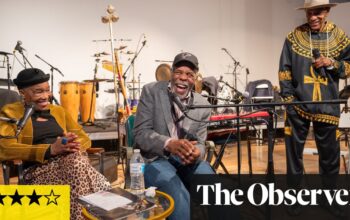T
There are numerous well-known tales of bands on tour, such as the Who being prohibited from staying at any Holiday Inn in the United States and Led Zeppelin’s John Bonham driving a Harley through the Chateau Marmont. However, how many musical groups can claim to have traveled around the world twice by boat during a four-year tour, visiting some of the most remote locations without any violent incidents among band members?
According to Grey Filastine, one half of the duo Filastine and Nova, all those who join the crew of the Arka Kinari are peculiar. Leaving behind their lives for months to earn minimal pay and put their lives at risk is not something everyone would do, making it a unique group of individuals.
The Arka Kinari is a sailing ship weighing 70 tonnes, named after the Latin word for “vessel” and a Sanskrit name for a mythical creature that is half-human, half-bird and protects the tree of life. It serves as a residence, touring boat, music space, and artistic endeavor for Filastine and Nova, who combine Javanese folk music with trippy synthesizers and drums to raise awareness about climate change. The vessel also doubles as their performance stage, complete with powerful speakers, elaborate costumes, and sails that transform into screens during their shows.
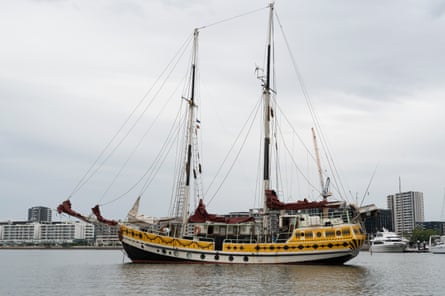
This is a message to all musicians around the world: it is feasible to tour in an environmentally friendly manner.
The Arka Kinari’s makeshift team, typically consisting of five to seven members recruited through online means, also serve as sound and lighting technicians in addition to their regular tasks of welding, carpentry, medical care, and cooking.
Filastine reflects on the peacefulness they always find during the months spent living and working together at sea. Despite any disagreements, they are able to find humor in their differences.
After that, he chuckles. “And you have no other place to be!”
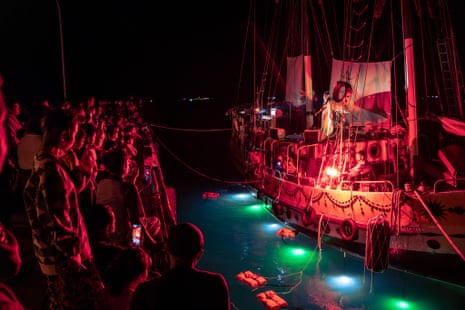
Since 2019, the Arka Kinari has traveled approximately 50,000 nautical miles. Despite Nova Ruth being from a seafaring tribe in Indonesia, neither she nor Filastine had any knowledge of sailing when they initially departed.
Filastine says, “Initially, I lacked knowledge in knot tying and distinguishing starboard from port. Now, after four years, I am the captain.” He reflects, “At times, I doubt my capabilities for this role. However, sailing 50,000 miles is a feat that most boat owners do not accomplish in their lifetime.”
As artists and advocates, they were both dissatisfied with the ecological consequences of touring. According to a study conducted in 2010, 75% of the music industry’s greenhouse gas emissions were generated from live shows. In 2009, it was calculated that U2’s global tour had a carbon footprint equivalent to a round-trip flight to Mars. In the past ten years, artists such as Harry Styles, the 1975, and Coldplay have made efforts to reduce the impact of their tours by implementing strategies such as planting trees, utilizing solar energy for their stages, and repurposing merchandise.
Eventually, Filastine and Nova discovered a way to convey their message. They sold their portion of a house in Seattle and took out a loan to purchase the Arka Kinari, a rundown schooner that they renovated in Rotterdam. Since then, they have traveled across the globe, showcasing their talents at various festivals such as the upcoming Sydney festival and Mona Foma in Tasmania in February. They also make stops at small fishing villages and coastal towns, where the residents are always intrigued by their presence.
Filastine explains that people often question why they are taking on such a challenging task. In response, he and his team bring up the topic of climate change and ask if the person has personally experienced its effects. This often leads to them sharing their own stories.
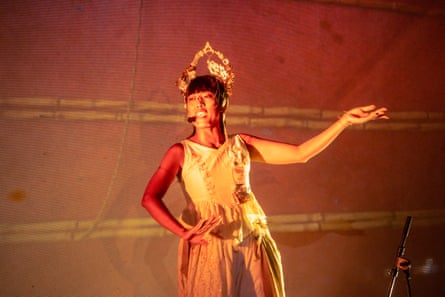
“I have observed the fluctuation of this problem, as it has gone in and out of popularity, since my teenage years. However, it is important to persistently stand by your beliefs. At times, others may dismiss you as overly cautious. Other times, they may support your viewpoint.”
Can you paraphrase this passage?
Is Filastine ever disappointed that most touring artists don’t prioritize sustainability? When asked about his project “Arka Kinari,” he describes it as a blend of practicality and idealism. It aims to inspire, but at what expense? The slow pace can be maddening, and the project is barely sustainable. It also relies on the unpredictable forces of nature, something that modern society has mostly disregarded.
For instance, they have been floating near the eastern shore of Australia for several weeks prior to their initial show, to steer clear of Cyclone Jasper in December.
According to Filastine, we are responsible for providing food and caring for a team of five individuals in Australia for several weeks before our performances begin. Therefore, we cannot expect other artists to do the same.
He goes on to say that life can be challenging for many individuals. Some may not be willing to tackle the most complex issue that humanity is currently facing. In his opinion, it is not fair for anyone to have to shoulder this burden alone. These issues are deeply ingrained in our systems and will require significant influence to bring about the necessary changes.
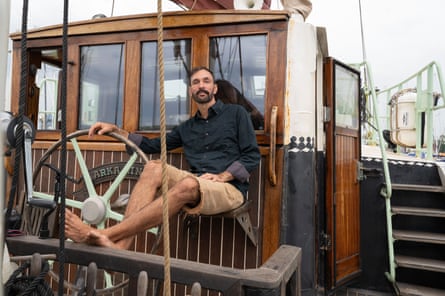
“Unfortunately, not everyone has the opportunity to spend a decade searching for a ship, preparing it, assembling a crew, and completely altering their lifestyle to become a sailor. It would be unfair to expect this from everyone. However, we can suggest that if we were able to do something this drastic, perhaps others can try something a bit less extreme.”
Filastine has observed personal changes after spending four years sailing. He now has more opportunities to be creative, learn, swim, dive, and think. He also has more time to admire the horizon, something he has never had much time for before. Additionally, he has been able to start reading again after a 10-year hiatus due to constant screen time. His taste in music has also shifted, as he now listens to longer classical pieces instead of short pop songs which don’t seem to fit the atmosphere at sea.
They have witnessed experiences that many individuals will never have the opportunity to experience. When the global health crisis emerged, the Arka Kinari was unable to find a place to dock, as most nations were only accepting their own citizens. After making an unplanned stop in Hawaii to gather several months’ worth of supplies, they continued their journey westward – uncertain of their next destination or when they would be able to set foot on land again.
“It was an incredibly challenging but oddly fortunate experience,” stated Filastine. “We essentially had one-third of the planet to explore on our own.”
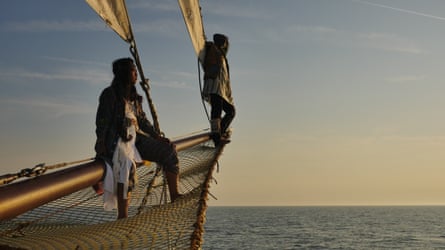
Display the image in full screen mode.
However, when the global shutdown occurred, certain previously inaccessible locations surprisingly became accessible. The Arka Kinari, in need of repairs, sought refuge at the deserted Pacific atolls that were once used by the US for experimentation with nuclear and biological weapons. These atolls had been uninhabited since their evacuation in the 1950s. The ship attempted to communicate for permission to dock, but received no response, indicating an unspoken approval.
On land, they discovered a completely intact time capsule. They came across a church with shattered windows and a Bible that remained open to a tattered page. At a school, they examined attendance records that decreased as the day of evacuation drew closer: starting with 100 students and gradually decreasing to 80, 60, 20, and finally only four. The surroundings were completely untamed, yet stunningly picturesque.
Filastine expresses that the atolls provided him with a sense of optimism. He was surprised to find that the most robust ecosystem he had ever witnessed was located near a nuclear testing facility. This shows that if humans give nature some space, it has the ability to flourish.
-
Arka Kinari will be featured at the Sydney festival on January 18-20, followed by a performance at Mona Foma in Tasmania on February 16-18 and 23-25. All shows are free of charge.
Source: theguardian.com
